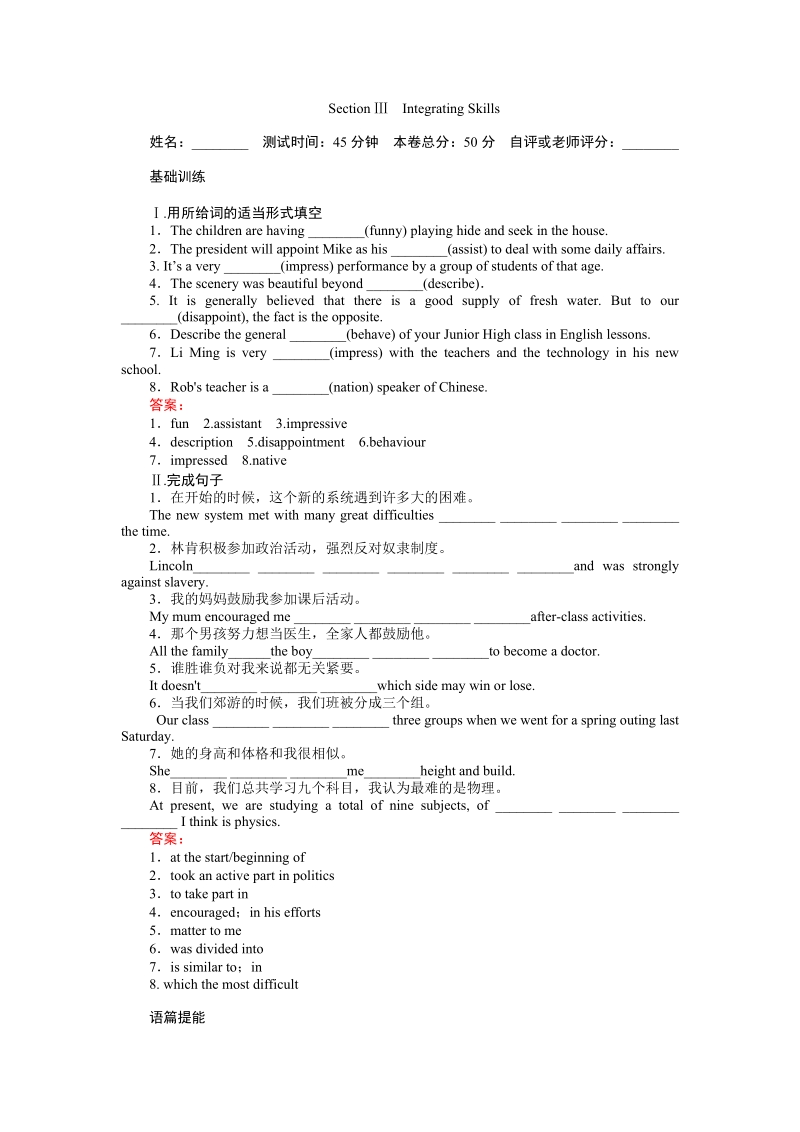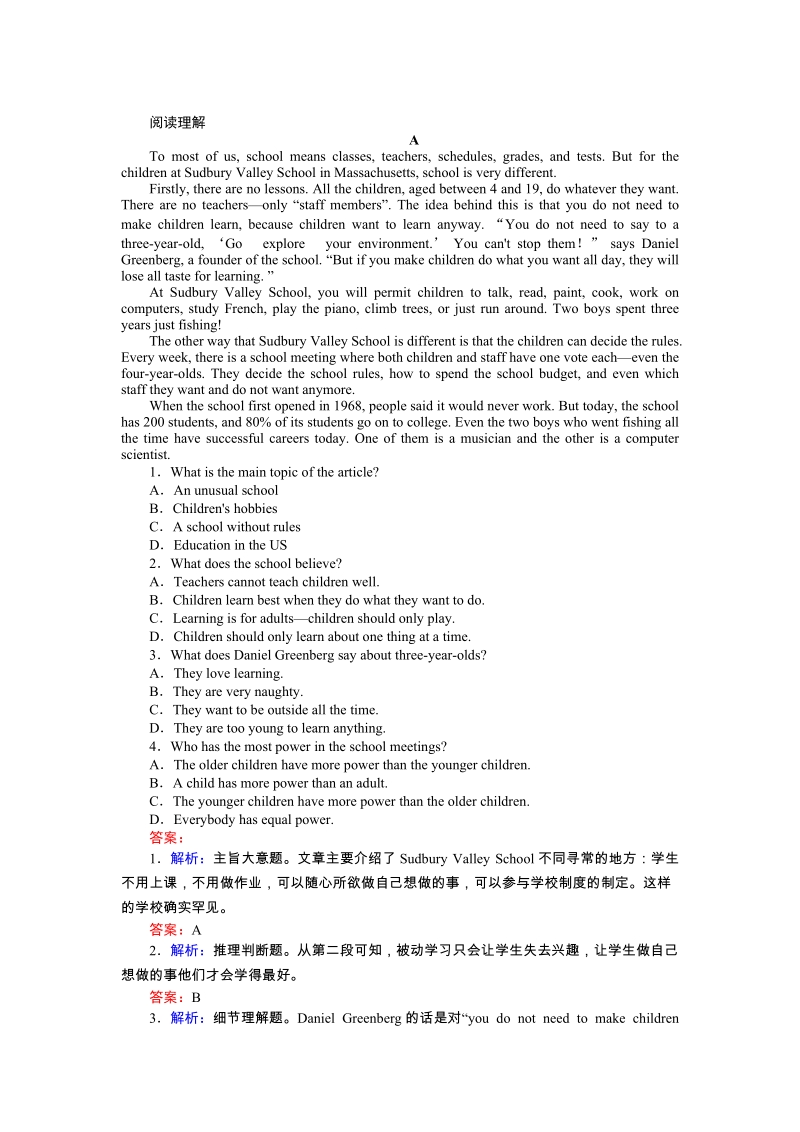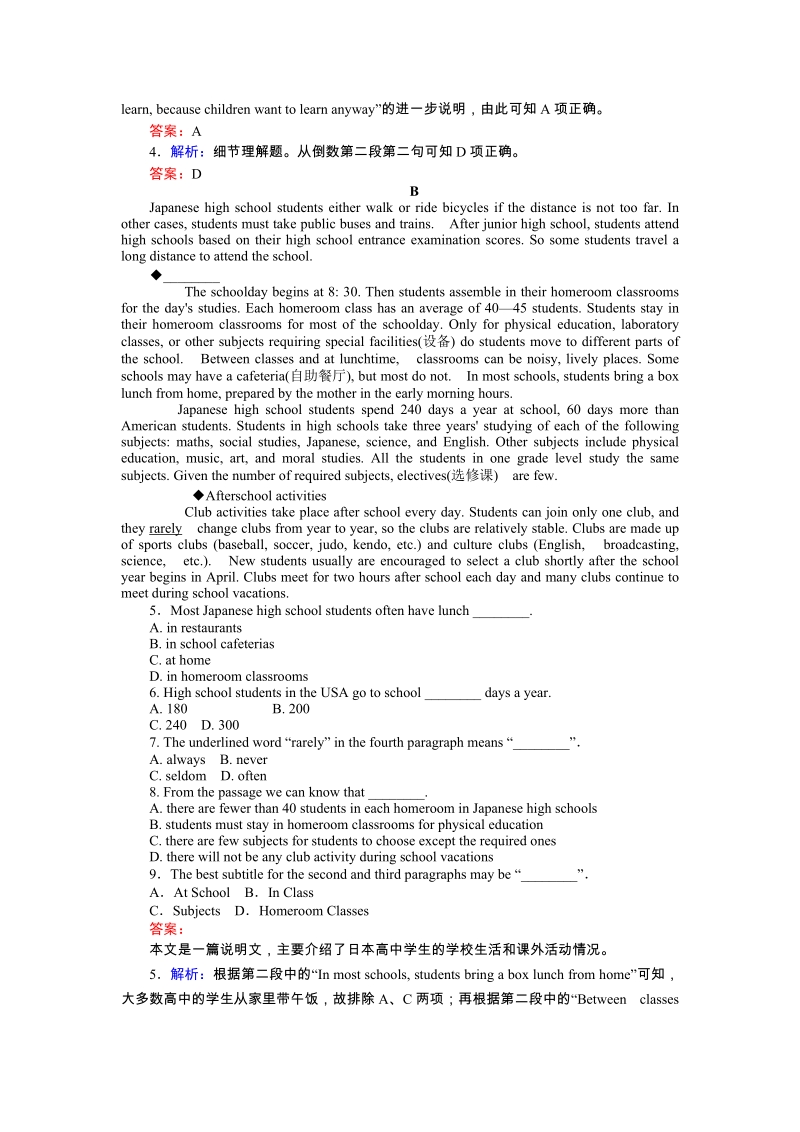 外研版高中英语必修一Module1 Section Ⅲ同步练习(含答案)
外研版高中英语必修一Module1 Section Ⅲ同步练习(含答案)
《外研版高中英语必修一Module1 Section Ⅲ同步练习(含答案)》由会员分享,可在线阅读,更多相关《外研版高中英语必修一Module1 Section Ⅲ同步练习(含答案)(4页珍藏版)》请在七七文库上搜索。
1、Section Integrating Skills姓名:_ 测试时间:45 分钟 本卷总分:50 分 自评或老师评分:_基础训练.用所给词的适当形式填空1The children are having _(funny) playing hide and seek in the house.2The president will appoint Mike as his _(assist) to deal with some daily affairs. 3. Its a very _(impress) performance by a group of students of that age
2、. 4The scenery was beautiful beyond _(describe)5. It is generally believed that there is a good supply of fresh water. But to our _(disappoint), the fact is the opposite. 6Describe the general _(behave) of your Junior High class in English lessons.7Li Ming is very _(impress) with the teachers and th
3、e technology in his new school.8Robs teacher is a _(nation) speaker of Chinese.答案:1fun 2.assistant 3.impressive 4description 5.disappointment 6.behaviour7impressed 8.native.完成句子1在开始的时候,这个新的系统遇到许多大的困难。The new system met with many great difficulties _ _ _ _ the time. 2林肯积极参加政治活动,强烈反对奴隶制度。Lincoln_ _ _
4、_ _ _and was strongly against slavery.3我的妈妈鼓励我参加课后活动。My mum encouraged me _ _ _ _afterclass activities. 4那个男孩努力想当医生,全家人都鼓励他。All the family_the boy_ _ _to become a doctor.5谁胜谁负对我来说都无关紧要。It doesnt_ _ _which side may win or lose.6当我们郊游的时候,我们班被分成三个组。Our class _ _ _ three groups when we went for a spring
5、 outing last Saturday. 7她的身高和体格和我很相似。She_ _ _me_height and build.8目前,我们总共学习九个科目,我认为最难的是物理。At present, we are studying a total of nine subjects, of _ _ _ _ I think is physics. 答案:1at the start/beginning of2took an active part in politics3to take part in4encouraged;in his efforts5matter to me6was divi
6、ded into7is similar to;in8. which the most difficult语篇提能阅读理解ATo most of us, school means classes, teachers, schedules, grades, and tests. But for the children at Sudbury Valley School in Massachusetts, school is very different.Firstly, there are no lessons. All the children, aged between 4 and 19, d
7、o whatever they want. There are no teachersonly “staff members”. The idea behind this is that you do not need to make children learn, because children want to learn anyway. “You do not need to say to a threeyearold, Go explore your environment. You cant stop them!” says Daniel Greenberg, a founder o
8、f the school. “But if you make children do what you want all day, they will lose all taste for learning. ”At Sudbury Valley School, you will permit children to talk, read, paint, cook, work on computers, study French, play the piano, climb trees, or just run around. Two boys spent three years just f
9、ishing!The other way that Sudbury Valley School is different is that the children can decide the rules. Every week, there is a school meeting where both children and staff have one vote eacheven the fouryearolds. They decide the school rules, how to spend the school budget, and even which staff they
10、 want and do not want anymore.When the school first opened in 1968, people said it would never work. But today, the school has 200 students, and 80% of its students go on to college. Even the two boys who went fishing all the time have successful careers today. One of them is a musician and the othe
11、r is a computer scientist.1What is the main topic of the article?AAn unusual schoolBChildrens hobbiesCA school without rulesDEducation in the US2What does the school believe?ATeachers cannot teach children well.BChildren learn best when they do what they want to do.CLearning is for adults children s
12、hould only play.DChildren should only learn about one thing at a time.3What does Daniel Greenberg say about threeyearolds?AThey love learning.BThey are very naughty.CThey want to be outside all the time.DThey are too young to learn anything.4Who has the most power in the school meetings?AThe older c



- 配套讲稿:
如PPT文件的首页显示word图标,表示该PPT已包含配套word讲稿。双击word图标可打开word文档。
- 特殊限制:
部分文档作品中含有的国旗、国徽等图片,仅作为作品整体效果示例展示,禁止商用。设计者仅对作品中独创性部分享有著作权。
- 关 键 词:
- 外研版 高中英语 必修 Module1Section 同步 练习 答案
 七七文库所有资源均是用户自行上传分享,仅供网友学习交流,未经上传用户书面授权,请勿作他用。
七七文库所有资源均是用户自行上传分享,仅供网友学习交流,未经上传用户书面授权,请勿作他用。



 浙公网安备33030202001339号
浙公网安备33030202001339号
链接地址:https://www.77wenku.com/p-40674.html